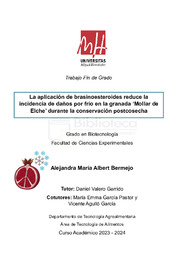Please use this identifier to cite or link to this item:
https://hdl.handle.net/11000/33066Full metadata record
| DC Field | Value | Language |
|---|---|---|
| dc.contributor.advisor | Valero Garrido, Daniel | - |
| dc.contributor.advisor | Agulló García, Vicente | - |
| dc.contributor.advisor | García Pastor, María Emma | - |
| dc.contributor.author | Albert Bermejo, Alejandra María | - |
| dc.contributor.other | Departamentos de la UMH::Tecnología Agroalimentaria | es_ES |
| dc.date.accessioned | 2024-09-11T12:38:54Z | - |
| dc.date.available | 2024-09-11T12:38:54Z | - |
| dc.date.created | 2024-06 | - |
| dc.identifier.uri | https://hdl.handle.net/11000/33066 | - |
| dc.description.abstract | La granada ‘Mollar de Elche’ es una fruta muy cultivada en la cuenca del Mediterráneo y apreciada por sus propiedades tanto organolépticas como funcionales. Sin embargo, esta fruta sufre daños por frío (DPF) durante su almacenamiento a temperaturas inferiores a 5 °C, lo que reduce significativamente su calidad. Por otro lado, los brasinoesteroides (Bras) son reguladores del crecimiento vegetal y en estudios recientes se ha observado un efecto en la reducción de los DPF en diversas frutas, incrementando su vida útil y calidad postcosecha. De este modo, el objetivo principal del presente estudio es la evaluación del efecto del tratamiento con Bras en precosecha sobre la tolerancia a los DPF en la granada ‘Mollar de Elche’, con el fin de hacer frente a esta problemática. Para ello, se aplicaron mediante pulverización foliar dos tratamientos: Control (árboles tratados con agua destilada) y Bras a la concentración 0,1 μM. Las granadas se conservaron a 2 °C y 85 % de humedad relativa durante 30, 60 y 90 días más 2 días a 20 °C (vida útil). Los parámetros físico-químicos que se evaluaron fueron las pérdidas de peso, tasa de respiración, incidencia de daños por frío externos e internos, firmeza, color externo e interno, contenido de sólidos solubles totales, acidez total y fuga de electrolitos. Además, se cuantificó el contenido de ácido malondialdehído (MDA), compuestos fenólicos totales, antocianinas totales e individuales, azúcares y ácidos orgánicos individuales y la actividad antioxidante total (AAT) de la fase hidrosoluble. Los resultados mostraron que el tratamiento precosecha redujo la incidencia de DPF en las granadas conservadas durante un periodo prolongado de 90 días en frío al reducir la fuga de electrolitos y el contenido de MDA. Además, el tratamiento precosecha con Bras incrementó la vida útil al retrasar las pérdidas de firmeza y de peso y reducir la tasa de respiración del fruto. Finalmente, el tratamiento mejoró la calidad nutricional y funcional de los frutos, incrementando el contenido de ácidos y azúcares, y estimulando el sistema antioxidante. | es_ES |
| dc.description.abstract | The ‘Mollar de Elche’ pomegranate is a fruit widely cultivated in the Mediterranean basin and appreciated for its organoleptic and functional properties. However, this fruit suffers Chilling Injury (CI) during its storage at temperatures below 5 °C, which significantly reduces its quality. On the other hand, Brassinosteroids (Bras) are plant growth regulators and recent studies have demonstrated a reduction on CI in some fruits, increasing their shelf-life and postharvest quality. Thus, the main objective of the present study is the evaluation of the effect of Bras in preharvest on the tolerance to CI in 'Mollar de Elche' pomegranate fruit, in order to address this problem. For this purpose, two treatments were applied by foliar spraying: Control (trees treated with distilled water) and Bras at concentration 0.1 μM. Pomegranate fruits were stored at 2 °C and 85 % of relative humidity for 30, 60 and 90 days plus 2 days at 20 °C (shelf-life). The physico-chemical parameters evaluated were weight losses, respiration rate, external and internal chilling injury incidence, firmness, external and internal colour, total soluble solids content, total acidity, and ion leakage. In addition, the content of malondialdehyde acid (MDA), total phenolic compounds, total and individual anthocyanins, individual sugars and organic acids and the total antioxidant activity (TAA) of the hydrophilic phase was quantified. The results showed that preharvest treatment reduced the incidence of CI in pomegranate fruits stored for a prolonged storage period of 90 days in cold conditions by reducing ion leakage and MDA content. In addition, preharvest treatment with Bras increased the shelf-life throughout a delaying on losses of weight and firmness and reducing the respiration rate of the fruit. Finally, the treatment improved the nutritional and functional quality of fruits, increasing the content of organic acids and sugars, and stimulating the antioxidant system. | es_ES |
| dc.format | application/pdf | es_ES |
| dc.format.extent | 37 | es_ES |
| dc.language.iso | spa | es_ES |
| dc.publisher | Universidad Miguel Hernández de Elche | es_ES |
| dc.rights | info:eu-repo/semantics/openAccess | es_ES |
| dc.rights.uri | http://creativecommons.org/licenses/by-nc-nd/4.0/ | * |
| dc.subject | Punica granatum L. | es_ES |
| dc.subject | compuestos bioactivos | es_ES |
| dc.subject | elicitor | es_ES |
| dc.subject | fuga de electrolitos | es_ES |
| dc.subject | vida útil | es_ES |
| dc.subject | bioactive compounds | es_ES |
| dc.subject | ion leakage | es_ES |
| dc.subject | shelf-life | es_ES |
| dc.subject.classification | Tecnología de Alimentos | es_ES |
| dc.subject.other | CDU::6 - Ciencias aplicadas::63 - Agricultura. Silvicultura. Zootecnia. Caza. Pesca | es_ES |
| dc.title | La aplicación de brasinoesteroides reduce la incidencia de daños por frío en la granada ‘Mollar de Elche’ durante la conservación postcosecha | es_ES |
| dc.type | info:eu-repo/semantics/bachelorThesis | es_ES |

View/Open:
AlbertBermejo_AlejandraMaría.pdf
2,65 MB
Adobe PDF
Share:
.png)
